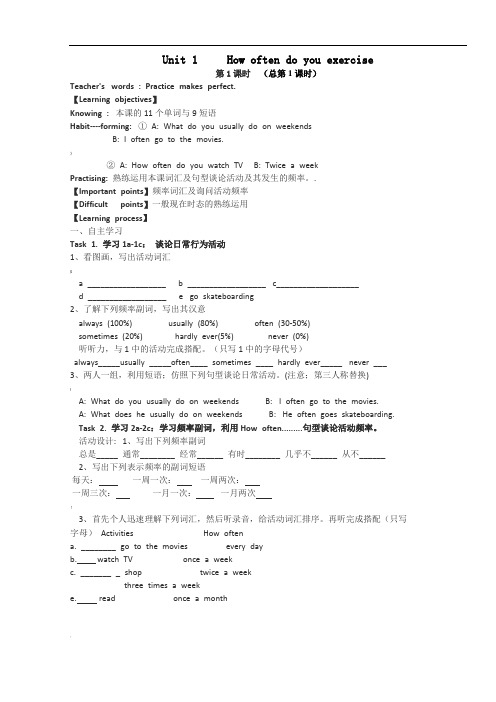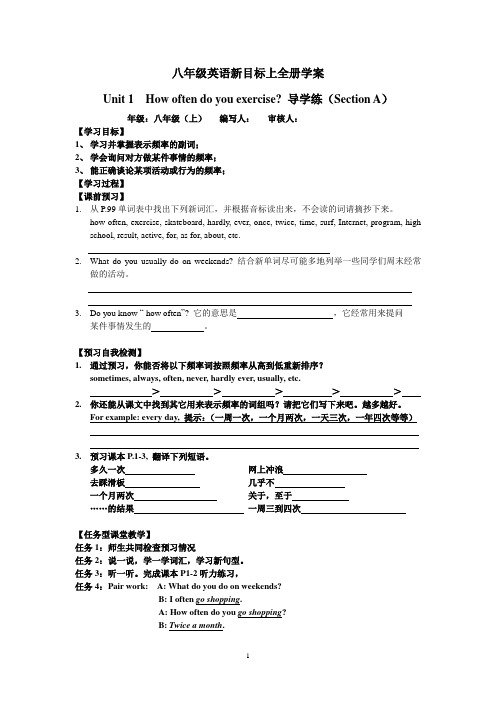2014秋新目标八年级英语上册全册导学案:1-3
- 格式:doc
- 大小:46.50 KB
- 文档页数:2

Unit 1 How often do you exercise第1课时(总第1课时)Teacher's words : Practice makes perfect.【Learning objectives】Knowing :本课的11个单词与9短语Habit----forming: ①A: What do you usually do on weekendsB: I often go to the movies.》②A: How often do you watch TV B: Twice a weekPractising:熟练运用本课词汇及句型谈论活动及其发生的频率。
.【Important points】频率词汇及询问活动频率【Difficult points】一般现在时态的熟练运用【Learning process】一、自主学习Task 1.学习1a-1c:谈论日常行为活动1、看图画,写出活动词汇$a __________________b __________________ c___________________d __________________e go skateboarding2、了解下列频率副词,写出其汉意always (100%) usually (80%) often (30-50%)sometimes (20%) hardly ever(5%) never (0%)听听力,与1中的活动完成搭配。
(只写1中的字母代号)always_____usually _____often____ sometimes ____ hardly ever_____ never ___3、两人一组,利用短语;仿照下列句型谈论日常活动。
(注意;第三人称替换)!A: What do you usually do on weekends B: I often go to the movies.A: What does he usually do on weekends B: He often goes skateboarding. Task 2.学习2a-2c:学习频率副词,利用How often.........句型谈论活动频率。

八年级英语新目标上全册学案Unit 1 How often do you exercise? 导学练(Section A)年级:八年级(上)编写人:审核人:【学习目标】1、学习并掌握表示频率的副词;2、学会询问对方做某件事情的频率;3、能正确谈论某项活动或行为的频率;【学习过程】【课前预习】1.从P.99单词表中找出下列新词汇,并根据音标读出来,不会读的词请摘抄下来。
how often, exercise, skateboard, hardly, ever, once, twice, time, surf, Internet, program, high school, result, active, for, as for, about, etc.2.What do you usually do on weekends? 结合新单词尽可能多地列举一些同学们周末经常做的活动。
3.Do you know “ how often”? 它的意思是,它经常用来提问某件事情发生的。
【预习自我检测】1.通过预习,你能否将以下频率词按照频率从高到低重新排序?sometimes, always, often, never, hardly ever, usually, etc.>>>>>2.你还能从课文中找到其它用来表示频率的词组吗?请把它们写下来吧。
越多越好。
For example: every day, 提示:(一周一次,一个月两次,一天三次,一年四次等等)3.预习课本P.1-3, 翻译下列短语。
多久一次网上冲浪去踩滑板几乎不一个月两次关于,至于……的结果一周三到四次【任务型课堂教学】任务1:师生共同检查预习情况任务2:说一说,学一学词汇,学习新句型。
任务3:听一听。
完成课本P1-2听力练习,任务4:Pair work: A: What do you do on weekends?B: I often go shopping.A: How often do you go shopping?B: Twice a month.任务5:阅读课本P3,完成下面的文章。


2013-2014学年度第一学期八年级上册英语导学案(2013.8)Unit1 Where did you go on vacation?(执笔:崔德魁)Period 1 Section A (1a-2c)知识目标1. 口、笔头掌握以下句型-Where did you go on vacation? -I went to the mountains.-Where did Tina go on vacation? -She went to the mountains.-Did you go with anyone? -Yes, I went with my mother.2.熟练掌握以下词汇:vacation, mountain, special, anyone技能目标:复习并掌握动词一般过去式的构成规律; 能用一般过去式叙述假期所做的事。
通过对过去事情的谈论,增进同学的相互了解。
1. 你能用英语写出下列短语吗?呆在家里_________ 去纽约市_________ 拜访我的叔叔_________ 去夏令营_________ 去爬山_________ 去海滩_________ 参观博物馆_________ 买特别的东西_________ 遇见有趣的的人_________ 做有趣的事情_________II. 回忆并默写出规则动词过去式的变化规则:1.______________2. ______________3. ______________4. ______________III. 做调查,问问你的同伴上个暑假都去了哪儿?Before listening1. 小组内交流课前准备1中的短语,并大声朗读三遍2. 两人一组,用课前准备III的内容对话。
3. Do 1a.观察与复习:1a 中用的动词是______时态。
规则动词过去式的变化规则是:(课前准备II)______________________练习:写出下列动词的过去式While listening1. 1b listen twice and number the people in the picture.2. 1c Pairwork. Make conversations about the people in the picture.3. 2a Listen twice and complete the chart.4. 2b Listen twice again and check Yes or No for each question.5. 模仿秀:听录音中的重点句段,反复跟读,模仿语音语调。

八年级英语上册教案导学案全册(人教版新目标)人教版八年级英语上册导学案全册Unit1Where did you go on vacationSection A集中识词【学习目标】:1,掌握重点单词的用法2,掌握重点句型:Where did you go on vacation?Did you go anywhere interesting?【学习重点】:一般过去时的复习【课前预习】:看P7,8,完成下列单词:(一个两遍)1. 任何人______________________2. 任何地方____________________3.精彩的__________________4.很少____________________5.大多数_____________________6. 某物;某事__________________7.没有什么____________________8.每人___________________9.我自己__________________________ 10. 你自己____________________11. 母鸡_________________12.猪_____________________________ 13.好像______________________14.厌烦的___________________15.某人_________________________ 16.日记______________________二.完成下列短语:(一个一遍)1. 相当多____________________2. 去度假___________________3.为考试而学习__________________4.照相____________________5.购物_____________________6.记日记__________________________7.当然__________________8.夏令营_________________9.出去___________________________10.第一次______________________11.在农村_________________________的内容,掌握并完成下列知识。

新目标八年级上册英语导学案(全册)(总74页)--本页仅作为文档封面,使用时请直接删除即可----内页可以根据需求调整合适字体及大小--Unit 1 How often do you exercise?第1课时(总第1课时)Teacher's words : Practice makes perfect.【Learning objectives】Knowing :本课的11个单词与9短语Habit----forming: ① A: What do you usually do on weekends?B: I often go to the movies.② A: How often do you watch TV? B: Twice a weekPractising:熟练运用本课词汇及句型谈论活动及其发生的频率。
.【Important points】频率词汇及询问活动频率【Difficult points】一般现在时态的熟练运用【Learning process】一、自主学习Task 1.学习1a-1c:谈论日常行为活动1、看图画,写出活动词汇a __________________b __________________ c___________________d __________________e go skateboarding2、了解下列频率副词,写出其汉意always (100%) usually (80%) often (30-50%)sometimes (20%) hardly ever(5%) never (0%)听听力,与1中的活动完成搭配。
(只写1中的字母代号)always_____usually _____often____ sometimes ____ hardly ever_____ never _ __3、两人一组,利用短语;仿照下列句型谈论日常活动。
(注意;第三人称替换)A: What do you usually do on weekends? B: I often go to the movies.A: What does he usually do on weekends? B: He ofte n goes skateboarding.Task 2.学习2a-2c:学习频率副词,利用How often.........句型谈论活动频率。
Unit 1 Where did you go on vacation?Section A 1 (1a-2d)黑水县中学刘涛一、教学目标:1. 语言知识目标:1) 能掌握以下单词:anyone, anywhere, wonderful, quite a few, most, something, nothing, everyone, of course, myself, yourself 能掌握以下句型:①—Where did you go on vacation? —I went to the mountains.②—Where did Tina to on vacation? —She went to the beach.③—Did you go with anyone? —Yes, I did./No, I didn’t.2) 能了解以下语法:—复合不定代词someone, anyone, something, anything等的用法。
—yourself, myself等反身代词的用法。
3)一般过去时态的特殊疑问句,一般疑问句及其肯定、否定回答。
2. 情感态度价值观目标:学会用一般过去时进行信息交流,培养学生的环保意识,热爱大自然。
二、教学重难点1. 教学重点:1) 用所学的功能语言交流假期去了什么旅行。
2) 掌握本课时出现的新词汇。
2. 教学难点:1) 复合不定代词someone, anyone, something, anything等的用法。
2) yourself, myself等反身代词的用法。
三、教学过程Ⅰ. Lead-in1. 看动画片来进入本课时的主题谈论上周末做了些什么事情,谈论过去发生的事情。
Ⅱ. Presentation1. Show some pictures on the big screen. Let Ss read the expressions.2. Focus attention on the picture. Ask: What can you see? Say: Each picture showssomething a person did in the past. Name each activity and ask students to repeat:Stayed at home, Went to mountains, went to New York City 6. Went to the beach,visited my uncle, visited museums, went to summer camp3. Now, please match each phrase with one of the pictures next to the name of theactivity,point to the sample answer.4. Check the answers. Answers: 1. f 2. b 3. g 4. e5. c6. a7. dIII. Listening1. Point to the picture on the screen.Say: Look at the picture A. Where did Tina go on vacation? She went to mountains.Ask: What did the person do in each picture?2. Play the recording the first time.3. Play the recording a second time.Say: There are three conversations. The people talk about what did on vacation. Listen to the recording and write numbers of the names in the right boxes of the picture.4. Check the answers.IV.Pair work1. Point out the sample conversation. Ask two Ss to read the conversation to the class.2. Now work with a partner. Make your own conversation about the people in the picture.3. Ss work in pairs. As they talk, move around the classroom and give any help they need.4. Let some pairs act out their conversations.V. Listening1. Tell Ss they will hear a conversation about three students’ conversations. Listen for the first time and fill in the chart. Then listen again and check Yes, or No.2. Let Ss read the phrases in the chart of 2b.3. Play the recording the first time. Ss listen and fill in the chart.4. Play the recording a second time for the Ss to check ―Yes, I did.‖or ―No, I didn’t. ‖5. Check the answers with the Ss.VI. Pair work1. Let two Ss read the conversation between Grace, Kevin and Julie.2. Let Ss work in pairs and try to role-play the conversation.3. Ask some pairs to act out their conversations.VII. Role-play1. First let Ss read the conversation and match the people and places they went.2. Let Ss act out the conversations in pairs.3. Some explanations in 2d.Homework:用英语询问你的一位好朋友,她(他)假期去了哪里?看到了什么?并将此对话写在作业上。
八年级英语导学案:上册(Unit1---Unit4)【大中小】八年级上册导学案(Unit1---Unit4)Unit 1 编号:N0.1班级姓名小组组内评价教师评价学习内容:Section A 1a—2b.学习目标:1、掌握Page1-2页的单词和短语。
2、通过学习了解不同的活动类型,掌握常见的频度副词和表示频率的常用短语。
3、通过合作探究,熟练掌握和运用下列重点句型:What do you usually do on weekends? I usually go to the movies.What does he usually do on weekends? He usually does his homework. How often do you watch TV? I always watch TV.How often does she watch? She watches TV once a week.4、全力以赴,高效学习,在合作探究中培养团队协作精神。
学习重点:1、本节课应掌握的生词和短语.2、了解不同的活动,掌握和运用常见的频度副词及表频率的常用短语。
3、熟练掌握和运用学习目标中所要求的重点句型。
学习难点:1、how often 句型、频度副词和表频率的短语的运用。
2、运用所学知识进行综合运用。
能力立意:1、通过听力训练培养学生从听力中获取细节信息的能力。
2、通过对话练习,培养学生的口头表达能力。
自学指导:1、自学Page1-2页的单词。
(根据音标拼读、拼写单词并牢记)。
2、自学完成Section A 1a。
3、标出重要的短语和句型,标出疑难点,准备课堂中讨论解决。
正课:1、课前检查(5)2、合作探究(20)3、听力检测(8)4、学以致用(10)5、课堂小结(2)一、自学检测:( A.B. C层必做)根据句意或首字母提示填空:1. do you watch TV? Sometimes.2.Do you like e (运动)? Yes, It’s good for my health.3.I often s in the sea ,it’s very exciting.4.He swims in the river.“It’s very dangerous.” he says.5.What your favorite p ? It’s talk show.6.How often does Li Hai surf the Internet? T a week.翻译下列短语和句子多久一次上网几乎不在周末看电影看电视每天一周一次一月两次一年四次每两周三次你多久看一次电视?他从来不去看电影.二、合作探究:1、组内讨论解决自学检测中的疑难问题。